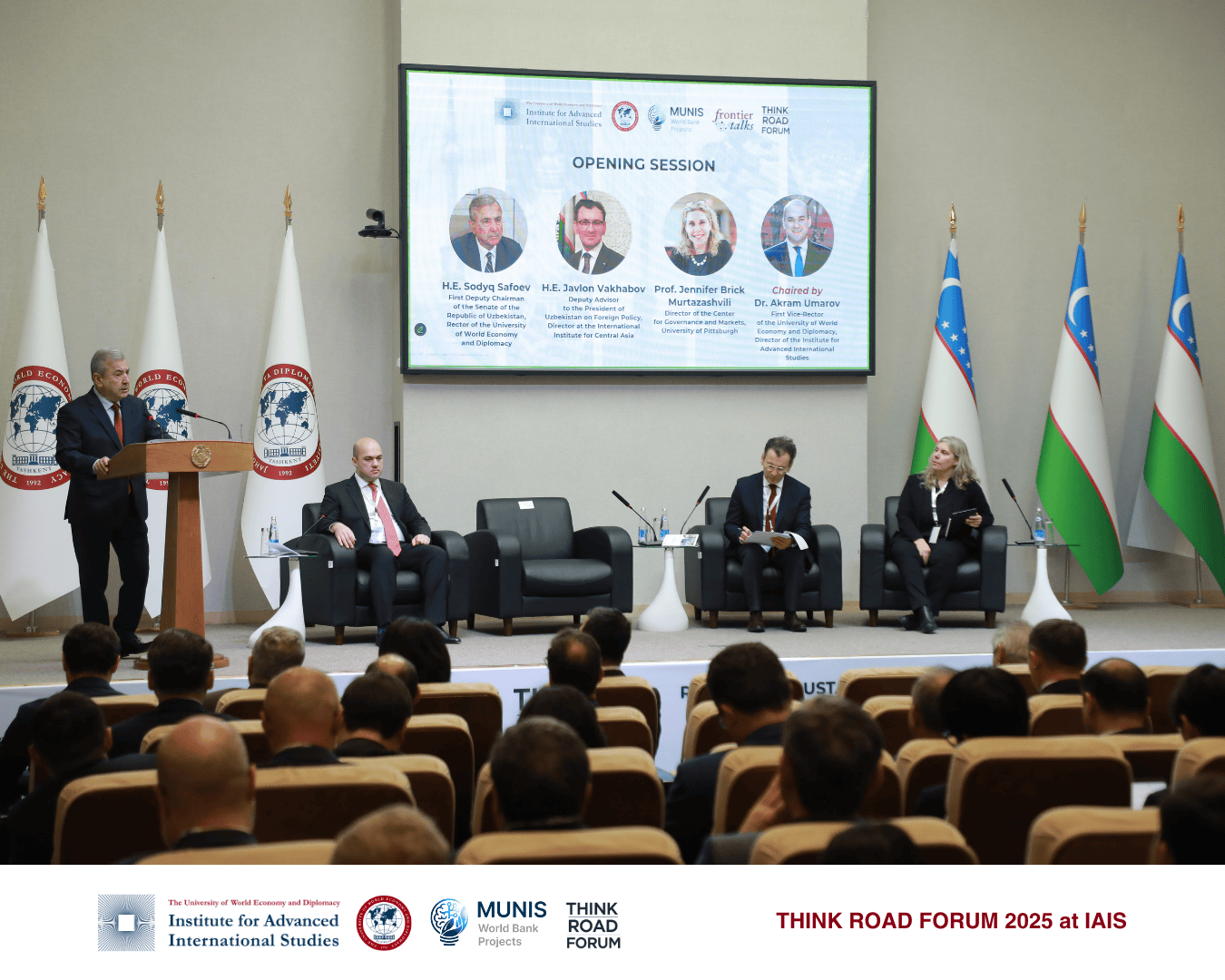
The Institute for Advanced International Studies (IAIS) at the University of World Economy and Diplomacy (UWED) hosted its flagship THINK ROAD FORUM on 18–19 November 2025 under the theme “Rethinking Sustainable Development in Central Asia in the Age of Emerging Regionalism”. The two-day conference brought together leading policymakers, diplomats, academics, experts, public sector, and civil society from across Central Asia and beyond to discuss how the region can pursue sustainable and inclusive development amid profound geopolitical and economic shifts.
The Forum featured high-level participation from key national ministries and agencies, research institutions and think tanks, the diplomatic corps. Major international and development organizations, as well as several leading universities and think tanks from the United States, Europe and Asia, are represented at the event, underscoring the Forum’s role as a genuinely international platform for dialogue on Central Asia’s future.
Designed as a space for evidence-based, policy-oriented discussion, THINK ROAD FORUM 2025 focuses on how a new wave of regionalism in Central Asia, combined with global transitions in energy, climate and technology, is reshaping the strategic choices of the region’s states and societies.
Conference opened with a high-level plenary chaired by Dr Akram Umarov, First Vice-Rector of UWED and Director of IAIS, featuring H.E. Sodyq Safoev, First Deputy Chairman of the Senate of the Republic of Uzbekistan and Rector of UWED, H.E. Javlon Vakhabov, Deputy Advisor to the President of Uzbekistan on Foreign Policy and Director of International Institute for Central Asia, and Prof. Jennifer Brick Murtazashvili, Director of the Center for Governance and Markets at the University of Pittsburgh.
The first day covered four interlinked sessions on geopolitical and security considerations for sustainable development in Central Asia; sustainable economic development, trade, investment and connectivity; accelerating the transition from fossil fuels to renewable energy; and regional climate change adaptation and water resource management.
Across these four sessions, participants discussed how shifting geopolitics and competing integration formats influence Central Asia’s security architecture and foreign policy choices; how regional economic corridors, transport routes and investment partnerships can support long-term, inclusive growth; how governments and business can design a just and orderly energy transition; and how enhanced regional cooperation on climate resilience, transboundary rivers and water diplomacy can underpin sustainable development and prevent future crises. Special attention is given to practical policy tools, regulatory reforms, and the role of regional institutions in managing common resources.
Day II began with the launch of “The Transition Trap: Three Decades of Transition in Central Asia” by Prof. Adham Khudaykulov, Rector of newly established Tashkent Tech University, setting the tone for an in-depth reflection on the social and technological dimensions of sustainable development. The second day then turned to two major themes: the social dimensions of sustainable development and the role of artificial intelligence and digital connectivity in shaping Central Asia’s future.
Two consequent sessions discussed how education systems, youth policies, social protection, gender equality and community-level engagement can be strengthened to ensure that the benefits of regional growth and integration are shared widely, including with vulnerable groups and remote regions. Participants examined how multi-stakeholder partnerships between governments, development partners, the private sector and universities can support an inclusive and human-centered digital transformation in Central Asia.
By convening leading figures from academia, international organizations, civil society, public sector and decision-makers THINK ROAD FORUM 2025 aims to build a sustained platform for dialogue and cooperation. Over two days, the discussions on geopolitics, economy, energy, climate, social policy, and digital transformation are expected to generate concrete ideas and partnerships that will help Central Asian states navigate emerging regionalism and move towards a more sustainable, inclusive, and resilient future. In doing so, IAIS at UWED reaffirms its core mission of bridging academic research with practical policymaking, ensuring that evidence-based analysis informs strategic decisions in Uzbekistan and across Central Asia, and that regional policy debates, in turn, shape the Institute’s research agenda and teaching.